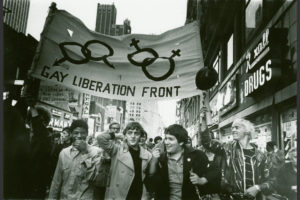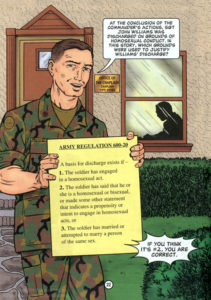LGBTQ in U.S Military
There were many waves of LGBTQ movements that started in the 1920s. The 1950s was a generally negative time for LGTBQ. This includes the lavender scare in which Eisenhower fired federal employees if they were homosexual. This was due to the belief that they were connected to communism and were a threat to national security. By the 60s though, there were increasing advancements.

Since then the Stonewall riot happened in 1969, Harvey Milk, was the first openly gay man who was elected in California, homosexual marriage was legalized, and it was no longer deemed a mental disease.

In the military specifically, before the “don’t ask, don’t tell legislation in 1993 under Clinton, homosexuality was completely illegal in the military due to medical reasons. Eisenhower in the 50s put forth an executive order firing homosexuals from federal offices. Department of Defense claimed that Homosexuality was incompatible with the military and thousands were discharged. Don’t ask don’t tell policy allowed LGBTQ in the military, as long as they did not claim they were homosexual. In 2011, the Don’t ask Don’t Tell policy, or Amry regulation 600-20, was repealed. By 2015 there were an increase in pro-LGBTQ legislation, representation, and attitudes. In 2015, transgender were allowed in the military, but by 2018, Trump reversed this because “‘accommodating gender transition could impair unit readiness,’ ‘undermine unit cohesion’ and ‘lead to disproportionate costs.’ 1
Sociology has a few lenses in which sociologists can view the world. Two of these theories are the functionalism and the symbolic interactionist theory.
The functionalist perspective claims that, whether positive or negative, the social issue exists because it has a function within society. For example, the don’t ask don’t tell policy and the recent anti-transgender law can be explained through this theory because it has a purpose. Many service members argue for anti-LGBTQ laws because “ (a) homosexuality is immoral; (b) homosexuality would have adverse effects of cohesion, morale, and good discipline; and (c) the fear of intimate situations with someone of the same gender who may be attracted to them.” 2 Under the functionalist perspective, this social issue exists because military would not function as well with LGBTQ members. One can also look at the opposite side of this claiming that this social issue exists since pro-LGBTQ legislation’s purpose is to get more service members. As for the symbolic interactionist perspective, society is explained by how people interact with each other through symbols. One can say that the constant use of the word faggot between younger men is an example of this. Even if the term is used and is not in reference to homosexuals, by calling each other fags, the theory is fulfilled. Fag is now associated with not only homophobia but also masculinity and identity. If you are a fag, you aren’t a man. The term itself is completely negative and within boys, it is used as a checking system to prevent one from going outside gender norms. The novel, “Dude, you’re a Fag: Masculinity and Sexuality in High School” by C. J. Pascoe goes in-depth about this topic and studies how the term Faggot affects the identity of adolescent boys.
Work Cited and Footnotes
1 Moreau, Julie. “Trump’s Transgender Military Ban ‘Worse than Don’t Ask, Don’t Tell,’ Advocates Say.” NBCNews.com. NBCUniversal News Group, March 26, 2018. https://www.nbcnews.com/feature/nbc-out/trump-s-transgender-military-ban-worse-don-t-ask-don-n860181.
2 PhdLCSW, G. Dean Sinclair. “Homosexuality and the Military: A Review of the Literature.” Taylor & Francis, May 10, 2007. https://www.tandfonline.com/doi/full/10.1080/00918360903054137.